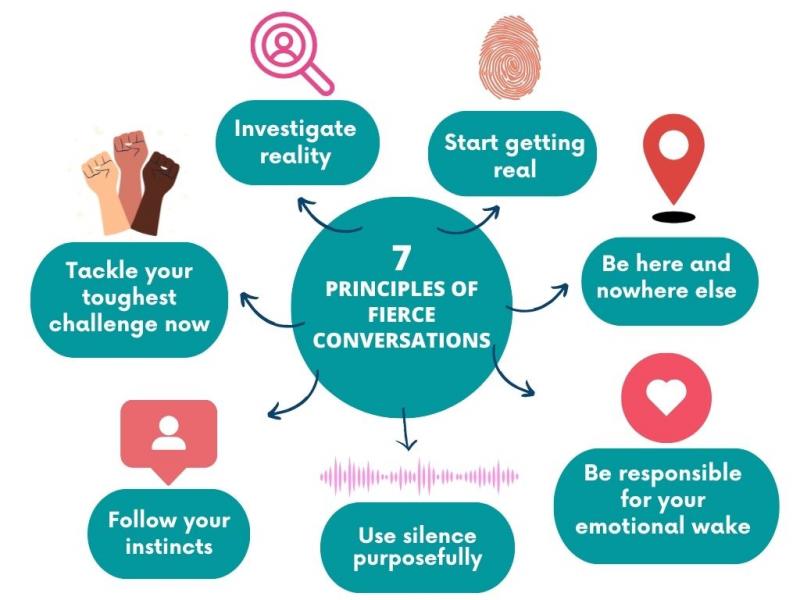Having a ‘fierce conversation’ doesn't necessarily entail conflict or aggression but rather implies engaging in candid, passionate and impactful discussions. School leaders, who often face challenging and passionate conversations, must learn how to navigate these tough discussions effectively.

What does having a fierce conversation mean to you? Does this sound like a powwow that is intense and simmering with conflict? Is it a testy tête-à-tête and one word away from fisticuffs? Would you prefer to avoid a gusty korero because you want an easy life?
But wait! If you are a school leader, you're on the front line, which means you'll have plenty of challenging chinwags. They will also be passionate and potentially volatile.
So, how do we deal with having those tough chinwags?
In this series of webinars, author Donna Westwood will take you through the six units in the From Teacher to Leader: Middle Leadership Essentials course.
In her book Fierce Conversations, Susan Scott reminds us that 'fierce' has a broader meaning than intense. It can also mean robust, strong, powerful, passionate, eager, unbridled, uncurbed and untamed. Scott says, 'In its simplest form, a fierce conversation is one in which we come out from behind ourselves into the conversation and make it real.'
Scott identifies seven principles that serve as a 'guide to tackling your toughest challenges and enriching relationships with everyone important to your success and happiness through principles, tools, and assignments designed to direct you through your first fierce conversations with yourself on to the most challenging and important conversations facing you'.

No plan survives its collision with reality and reality has a habit of shifting at work and home. Markets and economies change, requiring shifts in strategy.
People change and forget to tell each other – colleagues, customers, spouses and friends. We are all changing all the time. Not only do we neglect to share this with others, but we are skilled at masking it even to ourselves.
While many fear 'real', it is the unreal conversation that should scare us. Unreal conversations are expensive for the individual and the organisation. No one has to change, but everyone has to have the conversation.
When the conversation is real, the change occurs before the conversation is over. You will accomplish your goals largely by making every conversation you have as authentic as possible.
Our work, relationships and lives succeed or fail one conversation at a time. While no single conversation is guaranteed to transform a company, a relationship or a life, any single conversation can. Speak and listen as if this is the most important conversation you will ever have with this person. It could be. Participate as if it matters. It does.
Burnout doesn't occur because we're solving problems; it happens because we've repeatedly tried to solve the same problem. The problem named is the problem solved. Identify and then confront the real obstacles in your path. Stay current with the people important to your success and happiness. Travel light and agenda-free.
Don't just trust your instincts – obey them. Your radar screen works perfectly. It's the operator who is in question. An intelligence agent is sending you messages every day, all day. Tune in. Pay attention. Share these thoughts with others. What we label as an illusion is the scent of something real coming close.
For a leader, there is no trivial comment. Something you don't remember saying may have devastated someone who looked to you for guidance and approval. The conversation is not about the relationship; the conversation is the relationship. Learning to deliver the message without the load allows you to speak with clarity, conviction and compassion.
When there is simply a whole lot of talking going on, conversations can be so empty of meaning that they crackle. Memorable conversations include breathing space. Slow down the conversation so that insight can occur in the space between words and you can discover what the conversation really wants and needs to be about.
We all have a genuine hunger for conversations that build our world of meaning, but how many of us get to satisfy that hunger?

How you handle a conversation can make or break a relationship. Tread carefully!
Every conversation we have needs to be a learning conversation. As Scott says: 'Conversations are the work of a leader and the workhorses of an organisation.'
Scott states that conversations are the work of the leader. She identifies four conversational models that become workhorses for the organisation:
These conversational contexts are all powerful, but one of the fiercest is the context that promotes confrontation. These are the situations to train staff as black-belt conversationalists and to nurture their dialogue and responses by setting up deliberately argumentative chats.
These exchanges give colleagues safe opportunities to think, edit and argue from more than one point of view and to manage expectations. It also allows you to help them respond to difficult conversations they could easily avoid and learn how to defuse tricky situations.
Setting up deliberately argumentative chats enables you to:
It's time to get fierce!
Manage resource, risk and reputation through strong financial management, confident leadership and effective recruitment and retention.